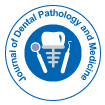开放获取期刊获得更多读者和引用
700 种期刊 和 15,000,000 名读者 每份期刊 获得 25,000 多名读者
抽象的
Assessing the degree of acceptance of dental treatments by children and adolescents through the use of behavioural treatment techniques
Madalina Croitoru
The purpose of this paper was to determine if behaviour management can modify in a positive manner the degree of acceptance of dental treatment in children and adolescents and to assess the influencing factors of the patients’ behavioural pattern.
One of the cornerstones in practicing paediatric dentistry is the ability to guide children positively throughout their dental experience and encourage positive dental attitude in order to improve their oral and overall health. Anxiety associated with the dental procedures can be reflected in the child’s behaviour. Therefore, it is important for dentists to evaluate psychological personal traits and to modify the management approach to reduce their anxiety.
A cross-sectional study was performed on 312 children aged 2 to 14 years (m.a. 6.44±0.19 years) attending the Pedodontics Dental Clinic of the “Carol Davila” University of Medicine and Pharmacy in Bucharest, Romania for routine dental care. The improvement of the patients’ behavioural pattern was attempted using the “tell-show-do” technique, positive reinforcement, ART technique, voice modulation, systematic desensitivation, non-verbal communication and behavioural modelling. Their behaviour was evaluated using Frankl’s scale at every visit at the clinic. Statistical analysis was performed using PSPP 1.2 afp005.
A positive modification of the behavioural pattern was recorded in 93.7% of cases. The main factors influencing the behavioural pattern were age and the use of ART techinique (p<0.05).
Behavioural treatment can be a valuable tool in improving the acceptance of dental treatments in children and adolescents

 English
English  Spanish
Spanish  Russian
Russian  German
German  French
French  Japanese
Japanese  Portuguese
Portuguese  Hindi
Hindi